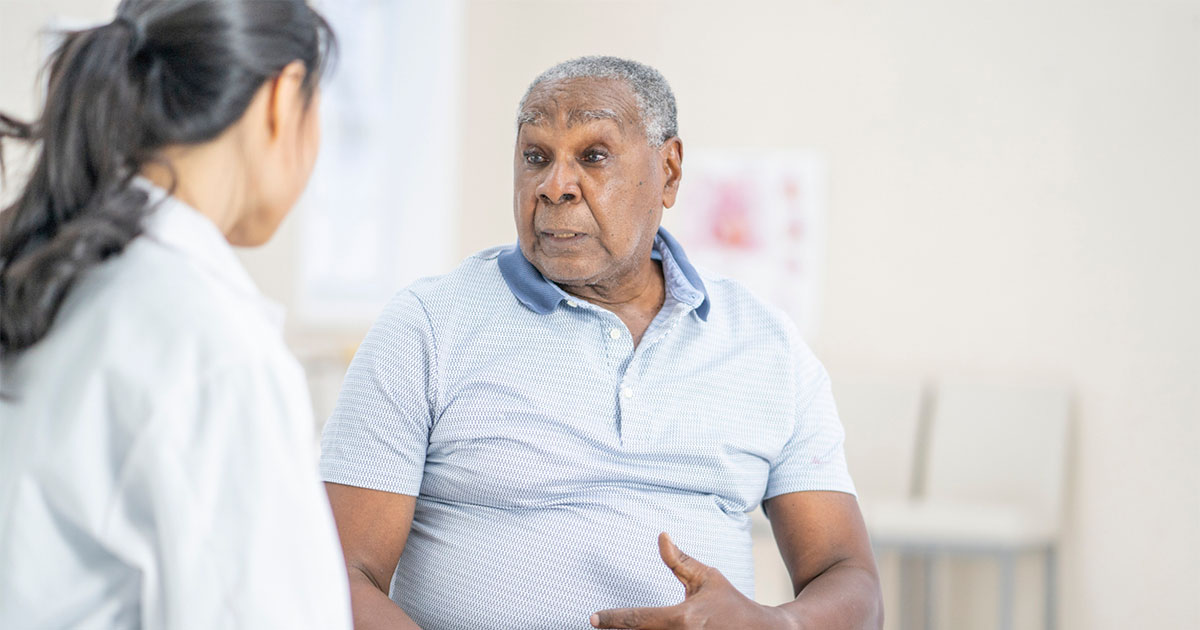Although many people with diabetes manage the condition successfully on a daily basis, being unwell for a non-diabetes reason can cause disruption to the usual blood glucose control. The effect of illness typically increases insulin resistance, resulting in raised blood glucose levels, even if appetite is poor, through increased glucose production by the liver, especially in the presence of infection and ketones. However, blood glucose levels may not always rise, and, in type 2 diabetes, blood glucose levels may drop if individuals are not consuming their usual carbohydrate intake.
Questions to consider for people with diabetes and intercurrent illness
- Do they have type 1 or type 2 diabetes? The focus in type 1 diabetes is the management of potential development of ketones in the blood and avoidance of diabetic ketoacidosis (DKA), whereas the focus in type 2 diabetes is management of blood glucose.
- Do they need admitting? Someone with type 1 diabetes who is vomiting and has significant blood or urine ketone levels may have, or quickly develop, DKA. Someone with type 2 diabetes who has an un-recordable blood glucose reading on a blood glucose meter and who is dehydrated and confused may have, or be developing, hyperglycaemic hyperosmolar state (HHS). Both these conditions need urgent hospital admission (James, 2013).
- Are they able to eat and drink? Dehydration with hyperglycaemia-induced polyuria may necessitate intravenous fluid replacement if the person is unable to drink (TREND-UK, 2013).
- Are they able to test blood glucose levels (and blood or urine ketones if type 1)? Always test blood or urine ketones in anyone with type 1 or type 2 diabetes who is vomiting (TREND-UK, 2013). DKA can occur in people with a diagnosis of type 2 diabetes in the presence of severe illness, or in people with slow-onset type 1 diabetes incorrectly diagnosed with type 2 diabetes.
- Are they pregnant? Vomiting and raised blood ketones put the pregnancy at risk, so immediate or emergency secondary care support is required (NICE, 2015).
- Could the illness be related to diabetes medication? For instance, there is a risk of lactic acidosis associated with metformin exposure in people who are severely dehydrated (electronic Medicines Compendium, 2015), and rare cases of pancreatitis in people taking incretin-based therapies have been reported (European Medicines Agency, 2013).
General advice for anyone with diabetes
1 As the effect of illness on glycaemic control is not predictable, monitoring of blood glucose (and ketones for people with type 1 diabetes) is essential to assess the impact on diabetes control and inform treatment adjustment. I recommend that people taking insulin or sulphonylureas should be advised to test at least four times daily. If significant ketones are present (blood, ≥1.5 mmol/L; urine, moderate or above), 2-hourly testing should be encouraged to inform insulin adjustment.
2 Sugar-free fluids should be encouraged in order to counteract dehydration from hyperglycaemia-induced diuresis (at least 100 mL hourly; TREND-UK, 2013). Easily digested foods like ice cream, yoghurt, milky drinks and soup can be taken to provide carbohydrate if the person is unable to eat usual meals.
3 Treat the underlying cause if appropriate (e.g. antibiotics for infections), but treat the high blood glucose if it is induced by steroid treatment for another condition. Steroids often cause significant hyperglycaemia during the day, with relatively normal fasting blood glucose levels. This can generally be managed using a morning dose of gliclazide or daily basal human insulin taken at breakfast time (Joint British Diabetes Societies for Inpatient Care, 2014).
4 Insulin must never be stopped in someone with type 1 diabetes as the person will rapidly develop DKA. Generally, insulin doses need to be increased significantly, even if the person is unable to eat. For example, if blood ketones are between 1.5 and 3 mmol/L (or urinary ketones are above moderate), someone with type 1 diabetes will need to correct this with quick-acting insulin, calculated as 10% of the total daily insulin intake every 4 hours, as well as the usual insulin doses. Higher ketone levels will require 20% every 2 hours (TREND-UK, 2013).
5 People with type 2 diabetes should keep taking their diabetes treatments, including insulin, even if they are not eating – unless you suspect that the medication is causing the illness. Oral antidiabetes drugs and insulin may need adjusting and, in fact, insulin initiation may be temporarily needed. However, if the person is vomiting or has profuse diarrhoea and is significantly dehydrated, metformin and sodium–glucose cotransporter 2 inhibitors should be discontinued (TREND-UK, 2013).
When should you admit?
Anyone who you suspect has DKA or HHS should be admitted, and consideration for admission should also be given to pregnant women, children and people whose symptoms, blood glucose and ketone levels are worsening despite implementing the advice given above (TREND-UK, 2013).
Conclusion
Illness can have varying effects on glycaemic control, depending on the type of illness and type of diabetes. Frequent home monitoring will inform treatment adjustment. Everyone should be given simple illness advice as part of their structured education and have this reinforced at the annual diabetes review. A patient leaflet can be downloaded from the TREND-UK website (TREND-UK, 2014). This gives general practical advice for managing diabetes when unwell and also very specific advice about adjusting insulin doses.
Questions to test your knowledge
The answers are not necessarily found in this article.
1. Jane has type 1 diabetes and is not eating. She should stop insulin to prevent hypoglycaemia.
True or false?
2. The patient who is vomiting or has severe diarrhoea should temporarily discontinue metformin due to an increased risk of lactic acidosis.
True or false?
3. Ice cream, milky drinks and soup can be used to replace meals if the person is unable to eat regular meals.
True or false?
4. It is not necessary to check blood ketones in people with type 2 diabetes.
True or false?
5. How much extra insulin should be given in someone with type 1 diabetes with blood glucose of 18.2 mmol/L and blood ketones of 2 mmol/L who usually injects a total daily dose of 50 units of insulin?
Answers: 1 – false; 2 – true; 3 – true; 4 – false; 5 – 5 units of quick-acting insulin every 4 hours.





SURMOUNT-5 trial pits tirzepatide against semaglutide, plus behaviour change support, for weight loss.
15 May 2025